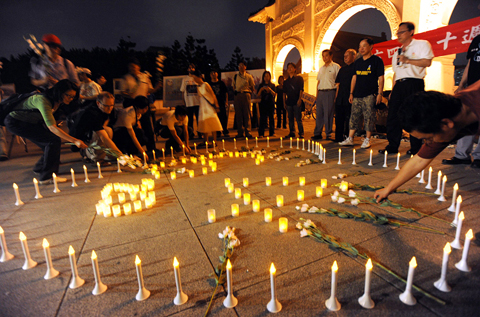The Mainland Democratic Movement Support Group (血脈相連大陸民主運動後援會) is unfamiliar to many in Taiwan’s younger generation.
But following the Tiananmen Square Massacre of June 4, 1989, it was a prominent activist group whose members secretly entered China to try to rescue threatened democracy activists.
Twenty years ago, it had more than 100 members, but that number dwindled over the years to less than a dozen.

PHOTO: WANG YI-SUNG, TAIPEI TIMES
The remaining members got together to organize a series of events in Taipei’s Liberty Square to commemorate the 20th anniversary of the massacre on Wednesday night.
The events began at 6:04pm on Wednesday when former New Party legislators Yao Li-ming (姚立明) and Chien Ta (錢達) led supporters as they rode bikes around National Taiwan Democracy Memorial Hall 20 times.
At around 9pm, Yao, Chien, Chinese democracy activist Cai Lujun (蔡陸軍) and former Democratic Progressive Party chairman Shih Ming-teh (施明德) delivered speeches and sang songs to commemorate the tragedy before staging an overnight sit-in on the square.
Photos taken at Tiananmen in 1989 and a documentary on the massacre were also shown.
Participants lit candles for those who died during the massacre.
Despite heavy rainfall yesterday, several people still remained at Liberty Square.
One volunteer, Ms Liu (劉), sobbed on Wednesday as she told the group’s story.
On the evening of June 3, 1989, students at Beijing’s Tiananmen Square and supporters in Taipei’s Chiang Kai-shek Memorial Hall sang with each other via a radio broadcast, which was abruptly cut off around 11pm, soon after Taiwanese artist Chen Pai-chung broadcast from the square that the Chinese army had entered Beijing. The Chinese Communist Party (CCP) then began their crackdown on the protesters.
Chen called on volunteers to support the democracy movement after returning from China. Later in 1990, the group raised funds from overseas Chinese democracy activists to purchase a secondhand cargo ship, the Goddess of Democracy (民主女神號), hoping to sail between Taiwan and China to broadcast the truth about the incident. Unexpectedly, the Taiwanese government refused to approve the plan.
Tainan businessman Wu Meng-wu (吳孟武) later bought the ship, which is now berthed in Tainan’s Anping Harbor as part of exhibits related to the incident.
The group’s annual commemoration ceremony continued for 10 years but because of dwindling membership, the event was changed to biannual.
Even the song Wound of History (歷史的傷口), sung by a group of Taiwanese singers to show their support, has gradually been forgotten.
The group attempted to contact old members this year, but was unable to track many of them down.
Others said it “was inconvenient to participate in politics again,” as they were doing business with China.
Meanwhile, the lack of interest of both the Taiwanese government and public disheartened members.
“I cannot accept the CCP regime’s method of killing civilians with tanks,” another volunteer, Ms Chung (鍾), said.
“Our aims have been simple over the past 20 years. Although cross-strait relations have improved, we have not altered our original intentions,” she said.
“We do not intend to subvert or eliminate the CCP regime. We just want to awaken the outside world’s most basic humanitarian concerns,” Chung said.

Chinese Nationalist Party (KMT) Chairman Eric Chu (朱立倫), spokeswoman Yang Chih-yu (楊智伃) and Legislator Hsieh Lung-chieh (謝龍介) would be summoned by police for questioning for leading an illegal assembly on Thursday evening last week, Minister of the Interior Liu Shyh-fang (劉世芳) said today. The three KMT officials led an assembly outside the Taipei City Prosecutors’ Office, a restricted area where public assembly is not allowed, protesting the questioning of several KMT staff and searches of KMT headquarters and offices in a recall petition forgery case. Chu, Yang and Hsieh are all suspected of contravening the Assembly and Parade Act (集會遊行法) by holding

PRAISE: Japanese visitor Takashi Kubota said the Taiwanese temple architecture images showcased in the AI Art Gallery were the most impressive displays he saw Taiwan does not have an official pavilion at the World Expo in Osaka, Japan, because of its diplomatic predicament, but the government-backed Tech World pavilion is drawing interest with its unique recreations of works by Taiwanese artists. The pavilion features an artificial intelligence (AI)-based art gallery showcasing works of famous Taiwanese artists from the Japanese colonial period using innovative technologies. Among its main simulated displays are Eastern gouache paintings by Chen Chin (陳進), Lin Yu-shan (林玉山) and Kuo Hsueh-hu (郭雪湖), who were the three young Taiwanese painters selected for the East Asian Painting exhibition in 1927. Gouache is a water-based

Taiwan would welcome the return of Honduras as a diplomatic ally if its next president decides to make such a move, Minister of Foreign Affairs Lin Chia-lung (林佳龍) said yesterday. “Of course, we would welcome Honduras if they want to restore diplomatic ties with Taiwan after their elections,” Lin said at a meeting of the legislature’s Foreign Affairs and National Defense Committee, when asked to comment on statements made by two of the three Honduran presidential candidates during the presidential campaign in the Central American country. Taiwan is paying close attention to the region as a whole in the wake of a

OFF-TARGET: More than 30,000 participants were expected to take part in the Games next month, but only 6,550 foreign and 19,400 Taiwanese athletes have registered Taipei city councilors yesterday blasted the organizers of next month’s World Masters Games over sudden timetable and venue changes, which they said have caused thousands of participants to back out of the international sporting event, among other organizational issues. They also cited visa delays and political interference by China as reasons many foreign athletes are requesting refunds for the event, to be held from May 17 to 30. Jointly organized by the Taipei and New Taipei City governments, the games have been rocked by numerous controversies since preparations began in 2020. Taipei City Councilor Lin Yen-feng (林延鳳) said yesterday that new measures by